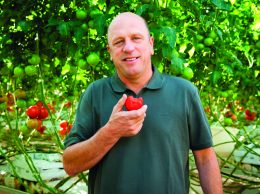CoLAB sues over land rules
IN THIS ARTICLE
- Law & Goverment Topic
- Stephen Nellis Author
By Stephen Nellis Friday, June 17th, 2011
A Ventura County agribusiness advocacy group is suing the county over a list of wildlife guidelines it says would add so much time and money to routine projects such as barn building that it would force fertile land out of production.
The Ventura County Coalition of Labor, Agriculture and Business, or CoLAB for short, filed suit over guidelines the Board of Supervisors passed in late April. The rules concern how county planners will consider wildlife on a landowner’s property when deciding what kind of environmental review is called for.
What has the agribusiness group up in arms is a list of more than 100 “locally important species” — plants and animals that are not protected on lists published by state, federal or private wildlife groups but that could spur extra scrutiny, up to and including the requirement of a full environmental impact report. The group says that those reports can be so time-consuming and costly for landowners that it would force agricultural land out of production because agribusinesses could not build the outbuildings and other facilities needed to do their work.
Just how much ag land the list would render unviable is not known, and that is what CoLAB is suing over. In court papers it argues that Ventura County’s agricultural resources are an important enough part of its landscape that the county needed to perform a full review under the California Environmental Quality Act, or CEQA. The county claimed the regulations were “categorically exempt” from CEQA review because regulations designed to protect the environment generally are, unless there’s evidence that proposed rules would cause a significant environmental impact.
Lynn Jensen, the executive director of CoLAB, said there was just such evidence in hearings that led up to the wildlife rules. “All we have to do is show a fair argument,” Jensen told the Business Times. “We thought we showed that really clearly, but they are just politically really tied to this.”
Officials in Ventura County’s planning department did not return requests for comment from the Business Times over several days.
Nathan Alley, an attorney with the Santa Barbara-based Environmental Defense Center, encountered a similar debate when working on proposed water quality rules affecting agricultural runoff on the Central Coast. In that case, regulators performed a review to learn how much farmland might be rendered unviable. The amount of farmland forced out of production wasn’t large enough to derail the rules.
But Alley said the question is more complicated because the rules passed in Ventura County are only guidelines so far. They don’t yet appear to be the kind of rubber-meets-the-road directions that regulators could use for defensible number crunching to discover how much agricultural land would be removed from ag uses, he said.
“I think it’s a valid question about conversion and the impacts of conversion, but it’s not quite as black and white as some are making it out to be,” Alley said.
Ventura County farmers have also bristled at the proposed list of “locally important species” because other farmers around the state and country won’t face the same restrictions. Alley argues that over the long term such rules could prove easier to navigate than state and local rules.
“When you’ve got local governments looking at threatened species and looking at how to help those species out, in a way that could obviate the need for protection on the federal Endangered Species Act,” Alley said. “In some ways, by local government taking these steps, they might save landowners the joy and delight of dealing with the [Endangered Species Act] process in the future.”
That is little comfort to Ventura County landowners who feel the regulatory process in the county has spiraled out of control. Elaine Krankl and her husband own Sine Qua Non Winery in Ojai near Lake Casitas. The winery is not open to the public, and that’s by choice — its wine is highly sought after by connoisseurs and collectors and can fetch hundreds of dollars a bottle. It is always sold out, Krankl said.
But she said her family has struggled to make the winery work. At one point, county regulators wanted to expand the protective boundaries of Lake Casitas in a way that would have made the Krankls’ vineyards unviable. They successfully fought the action but felt little notice was given to the public.
It took the Krankls two years to build a 12,000-square-foot winery on their land. Krankl said it took longer to secure the permit than to build the building. “You can’t even know whether you’ll be allowed to build until you’ve spent a tremendous amount of time and money,” Krankl said. “By the time we got to the point where went up for review, we had already spent hundreds of thousands of dollars.”










